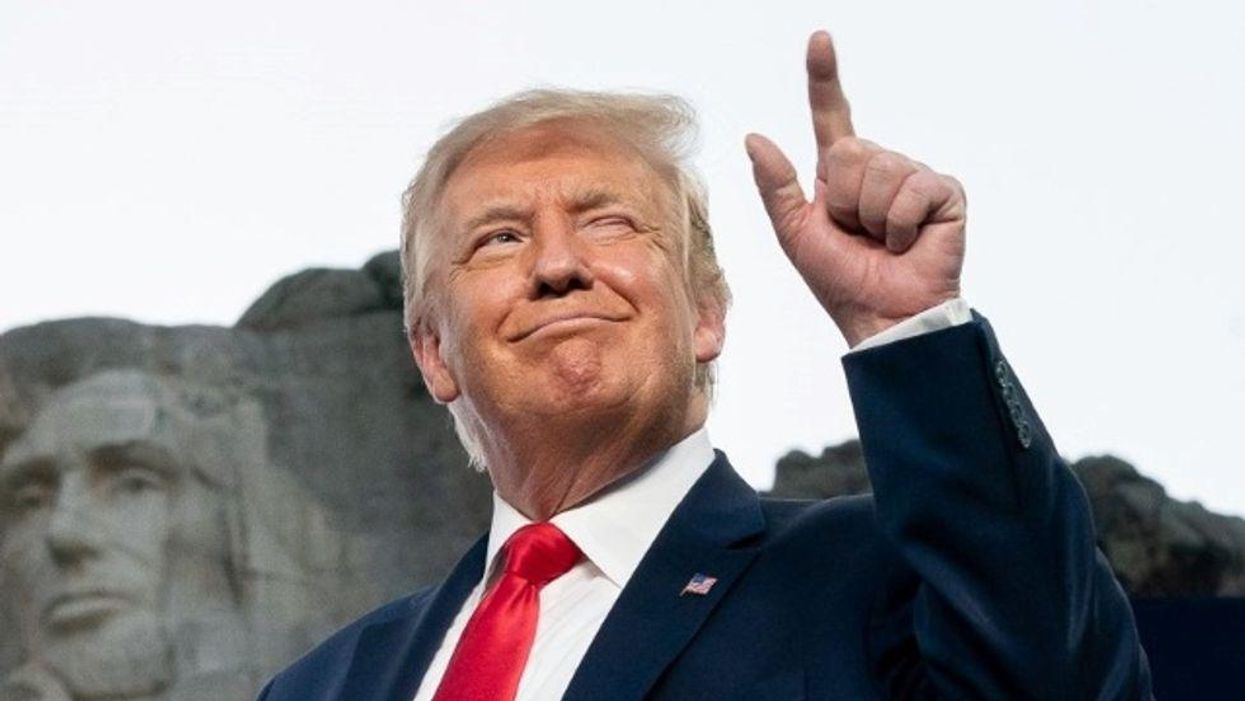Trump's 2024 Threat Is Serious-- But Ultimately He Will Lose
The big question isn't whether Donald Trump plans to run for president come 2024. Assuming that he's alive, relatively healthy, and not under criminal indictment, of course he will. He pretty much has to.
Never mind that at age 75, Trump looks like a stroke or coronary event waiting to happen. The show must go on. He needs all the cash he can raise. Otherwise, his lifelong grift could come to an ignominious, if not farcical end. Tax fraud convictions and spiraling bankruptcies would be the least of it.
And if he runs, Republicans will surely nominate him.
What's left of the party he's torn apart won't be able to help themselves. Formerly apostles of "small government" conservatism, the GOP has morphed into a quasi-authoritarian cult of personality.
And despite the staggering incompetence and low comedy that marked his 2020 "Stop the Steal" campaign, it's worth remembering that people laughed at Mussolini too. Charlie Chaplin's merciless satire of Hitler in The Great Dictator didn't appear until October 1940, a full year into World War II.
So it's definitely worthwhile heeding thoughtful warnings that next time an electoral coup might work. Although there's almost no chance that Trump could come anywhere close to winning a majority of American voters, GOP skulduggery could put him back in the White House. Assuming that a complacent majority allowed it to happen.
Longtime neoconservative author Robert Kagan, has recently published a thought-provoking Washington Post essay arguing that a constitutional crisis is already upon us. Kagan, who left the GOP in 2016, warns that "Most Americans — and all but a handful of politicians — have refused to take this possibility seriously enough to try to prevent it. As has so often been the case in other countries where fascist leaders arise, their would-be opponents are paralyzed in confusion and amazement at this charismatic authoritarian."
Certainly, Republicans are doing all they can to game the 2024 presidential election. Should they retake Congress in 2022, they'll do even more. So while it's possible that efforts to prevent minorities from voting could backfire—discouraging older white voters while energizing African-Americans—putting Republican state legislatures in charge of certifying elections is an ominous development.
Had that been so in 2020, Trump's comic opera coup attempt might have succeeded. Bob Woodward and Robert Costa's book Peril, detailed a six-part plan dreamed up by right-wing law professor John Eastman, who harangued the crowd along with Trump and Rudy Giuliani on January 6. The scheme required Vice President Mike Pence to invalidate electoral votes won by Joe Biden on the grounds that seven states had sent rival sets of electors to Congress.
"If Mike Pence does the right thing, we win the election," Trump told the mob before promising to march with them to the Capitol and "fight like hell" to save the country.
"You can either go down in history as a patriot," Trump reportedly told Pence "or you can go down in history as a pussy."
Meow!
Never mind the constitutional absurdity—how can the Vice President decide an election in which he's himself a candidate?—Eastman's scam failed for the simplest of reasons: no states sent rival delegations to the Electoral College.
Indeed, had they done so, the likeliest outcome would have been that Speaker Pelosi would have dissolved the joint session of Congress, leading to her temporarily assuming the presidency as the next in succession.
Oops!
As usual, Trump had neglected to read the fine print. The fact is, he probably can't. But that's another issue altogether.
Kagan's point is that, next time, Trumpist legislatures will definitely send those rival delegations. Or worse. Some Republican-dominated bodies are even considering overriding their state's popular vote, if necessary, to re-install Trump.
Purged of dissenters like Liz Cheney and Adam Kinzinger, today's Republicans have become what Kagan calls a "zombie party" in thrall to a cult of personality. "They view Trump as strong and defiant," he writes, "willing to take on the establishment, Democrats, RINOs, liberal media, antifa, the Squad, Big Tech, and the 'Mitch McConnell Republicans.'"
In other words, basically a list of cartoon enemies. If my own hostile reader emails are any guide, this is certainly true. To Trumpists, their rivals are fundamentally illegitimate. It's basically a pro-wrestling audience, excited by spectacle. To them, Trump's egomania is a feature, not a bug. He'll give no quarter to his enemies—and theirs.
"A Trump victory," Kagan concludes "is likely to mean at least the temporary suspension of American democracy as we have known it."
Which is exactly why it's not going to happen. Kagan is a learned and intelligent fellow, but he has a melodramatic imagination of his own. As a co-founder of the "Project for a New American Century," he pushed hard for remaking the world by invading Iraq.
His warnings are well-taken, but Kagan badly underestimates the determination of the democratic majority.









Trump Cabinet Nominee Withdraws Over (Sane) January 6 Comments